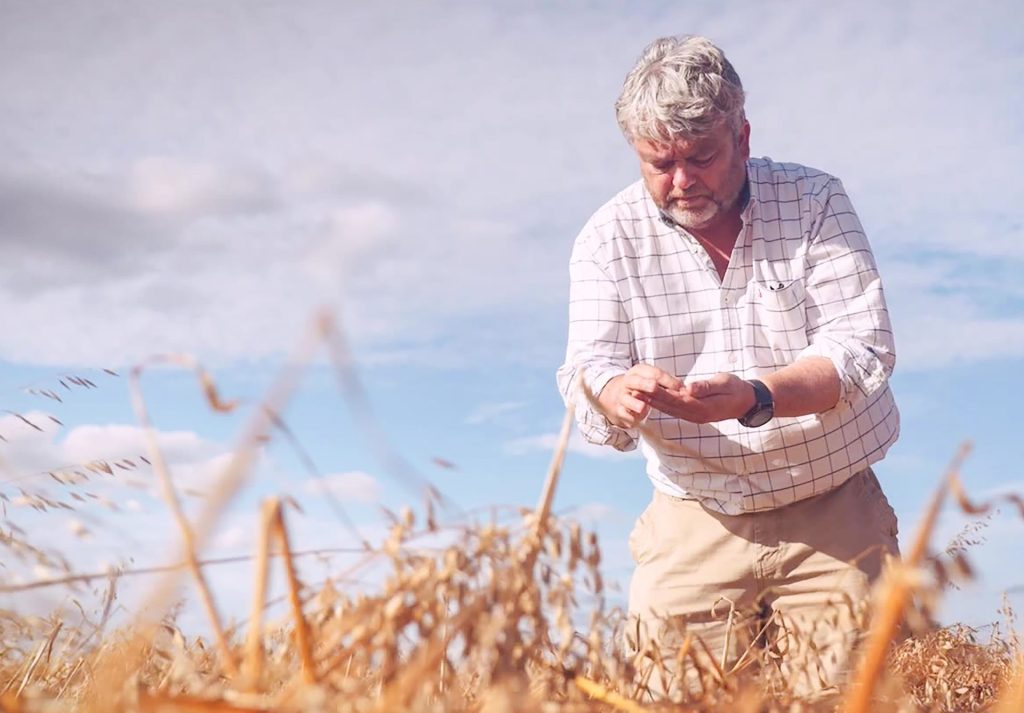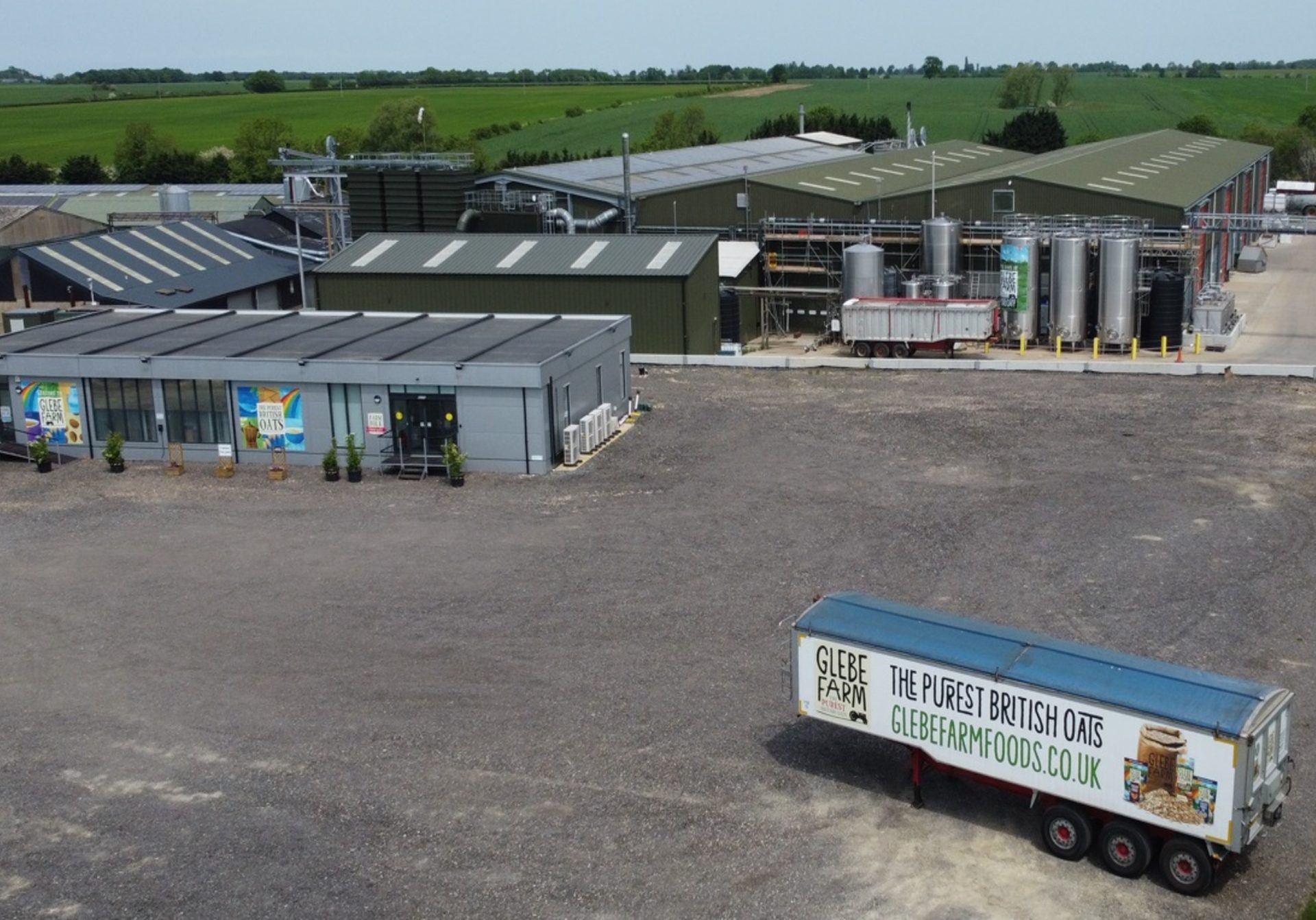Many people may not know that oats are technically gluten free, but due to their farming and manufacturing processes are at high risk of cross-contamination meaning those with coeliac disease, gluten allergy or severe gluten intolerances cannot consume them. They must consume gluten free oats only – which can be harder to find.
The Manufacturer’s Molly Cooper spoke with Founder and MD of Glebe Farm Foods, Philip Rayner, about his 100% gluten free oat farm and manufacturing facility in Cambridgeshire.
As an oat based food and drink manufacturer, Glebe Farm Foods provides its oats to many gluten free product manufacturers like Nairns and Biscuits International and its own PureOaty Branded products can be found in supermarkets such as Morrisons and Ocado, or on Amazon and in Farm Shops and Deli’s nationwide. PureOaty is also served in many food service outlets and cafes.
What inspired you to focus exclusively on producing 100% gluten free oats?
PR: My family have been farming in Cambridge since the 1970s and started as a mixed farm. My father was an engineer and helped with developing agricultural technology in the post-war period. My background is in technology engineering and my sister was in food marketing; in 2000 we began Glebe Farm Foods with the aim of growing British oats and producing them into delicious oat milk, flours, and cereals.
Oats can be grown in the UK, unlike other gluten free alternative foods such as rice starch, so we began to grow these and in 2009, we identified a gap in the market for 100% gluten free oats. It is often difficult for those living with coeliac disease and gluten intolerance to have a varied diet, but oats can provide a lot of protein and versatility in the ways they can be used. Once grown, we then learned how to mill oats, built a mill of our own and began exporting our product into Europe.
We found a product that people needed and developed it to the highest quality for our customers. This has grown into a great partnership with the gluten free industry in Britain, making it world class. In terms of innovation and driving growth, the British free from industry is miles ahead of the rest of the world.
Oats are a high-risk category when it comes to gluten cross-contamination. What are the key challenges involved in keeping your oats 100% gluten-free?
PR: Over 2.9 million people follow a gluten free diet – that’s roughly 4% of the population(Kantar FMCG Panel MAT to April 2024 vs Previous). This affects people in different ways, to the extent where even one grain of wheat can place someone out of action for a whole day with stomach problems, lethargy and brain fog. It can also lead to long-term, long-lasting health problems.
Oats can be contaminated with gluten. In standard farming practices, oats include up to one per cent of foreign grains such as wheat and barley and also contain cereals from other crops that have been previously grown in the fields, and from the mills, stores and dryers. As a business, no one pays for these to be removed, ensuring that gluten free comes at a price.
Starting from the seed, an entirely gluten free supply chain is needed from start to finish, creating a circular chain. Each risk needs to be removed to ensure a totally 100% pure product, 100% of the time.
Mistakes can’t be made when it comes to people’s health.
From my experience, in high-risk areas such as chemical and nuclear engineering, there’s a focus on engineering risk out of processes. I make sure I know each part of the process, working with suppliers so there is no room for error, and everything meets the required standards from the very beginning.
For us, it’s about building trust throughout the whole supply chain, including our customers, so everyone can sleep confidently knowing the process is safe and reliable.
You’re the only UK manufacturer with a Coeliac UK-certified oat drink range. What does this accreditation mean for consumers and how rigorous is the certification process?
PR: We produce PureOaty, the only oat drink in the UK that holds the Crossed Grain trademark from Coeliac UK and that’s because we ensure our facility meets the highest standards for gluten free production.
For a product to be 100% gluten free, it must be less than contain less than 20 parts per million (ppm) of gluten. Our products are always milled to a purity of under 5ppm, which is 4x less than the industry standard.
As we make our oat milk on-site, we have full control of our supply chain, effectively minimizing any risk of cross-contamination.
In the last two years, we have invested millions in a large Tetra pack plant facility, so everything is in one place. This plant is located on our farm and is capable of producing 24 million litres a year.
We also concentrate on the purity of products rather than trying to simply dilute the gluten levels like some brands.
In terms of accreditation, it’s about total control from start to finish.
How do you test and validate the gluten free status of your products? Are there particular technologies or protocols you rely on?
PR: We consistently test throughout our process to check for foreign grains most of which are still carried out by our team. Over the years we’ve become remarkably good at spotting grain contamination. There have also been developments in AI over the last few years to do this for us, and I’ve also worked on my own optical programmes which can make our processes easier. We have machines at the cleaning and dehulling stages that can be programmed to spot contaminates.
There are seven core tests in the process. First on the seed at the farm, then when it’s delivered, cleaned, milled, in sampling and finally at the very end, we conduct an ELISA (Enzyme-Linked Immunosorbent Assay) test. That final test is the rubber stamp to confirm that the product can be labelled as gluten free.
As a food manufacturer, what trends are you seeing in the food and drink sector?
PR: The gluten-free retail market is around £835 million(Kantar FMCG Panel MAT to April 2024 vs Previous) and the wider free from food & drink market is £3.9 billion, making up a significant part of the food market.
The free from market in the food service industry faces unique challenges including rapid staff turnover and the variety of foods being created at a fast pace.
The big food trend, however, right now is a move against ultra processed products, especially within the children’s snacking category. We work closely with a Scottish brand called Three Robins that saw a gap in the market for family friendly allergen-free drinks. We’re working with them on oat-based milk products that are sugar free and packed with lots of vitamins and minerals.
The plant-based milk category has started to flatten out and is very saturated. However, oats have always led in that area. Oat milk forms 46% of the dairy alternative category in volume and is the only type showing year on year growth(Kantar FMCG Panel MATs to 01/09/24 vs Prev Year). Although other options and variants like coconut milk are growing in popularity.
There’s also a long-term trend and growing focus towards sustainability, especially in the food and beverage industry, but it requires an enormous amount of work.
At Glebe Farm Foods our entire production process at Glebe Farm is powered by renewable energy, including three biomass boilers fuelled by by-products from oat milling, eliminating the need for fossil fuels. We’ve also expanded our solar capacity by installing an additional 467kW of roof-mounted solar panels and are actively exploring paper-based packaging to further reduce plastic use and environmental impact.
We have many circular processes, such as the recycling of water that we use for cleaning and for oats on our farm.
Our oat drinks produce 50% lower emissions compared to other oat brands and we are pushing for net zero in the next two to three years. It isn’t easy to do and many factors, such as price, need to be taken into consideration.
But oats are a sustainable British food and are sourced from our own farm and farming partners within 70 miles of our factory. Then once they enter the manufacturing process – they go from the mill, to processing and packing all in one place. This brings down our food mileage from oat milling to packing to just 150 metres.
We’ve had all our products externally tested by sustainability assessor My Emissions and we have our carbon footprint on all our packaging.
Looking ahead, what innovations or expansions are in the pipeline for Glebe Farm?
PR: We’re focused on reducing our carbon emissions and improving sustainability across our operations. I work closely with around 100 farmers here in the UK and I’m focused on carbon reduction because I see firsthand how climate change is affecting us. Biodiversity is another big concern.
We need to make sustainability work in practice. People talk a lot about regenerative farming and I want to know how to build a system that’s both regenerative and economically sustainable for farmers.
We’re also exploring ways to generate extra biomass to produce steam. On sunny days, we can generate all our power on-site without needing any external energy. It’s a step toward to a cleaner, more resilient future.
We are also continually innovating and expanding our product range to meet the needs of all kinds of consumers, from health-conscious adults to busy families looking for nutritious, plant-based alternatives.
The launch of Three Robins Choccoriffic Oat Mylk, in particular highlights our strong flavour profiling capabilities and ability to craft rich and appealing flavours that truly delight customers.
For more articles like this, visit our Innovation channel





